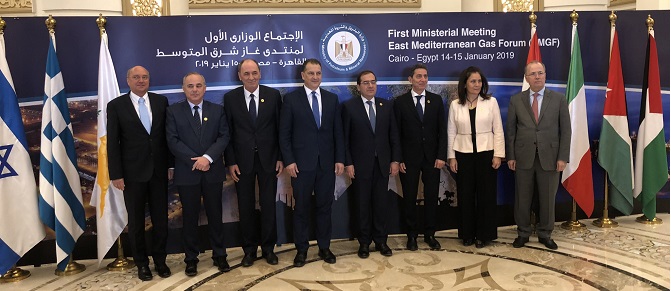Eastern Mediterranean’s energy ministers meeting in Cairo on January 14 has resulted in a turning point announcement for the region’s energy industry. Seven officials representing Egypt, Cyprus, Greece, Israel, Italy, Jordan and Palestine agreed to establish the East Mediterranean Gas Forum (EMGF) with the aim to expedite the development of hydrocarbon resources in the East Med, and transform the region into an energy hub. EMGF will be based in Cairo and will be open to new members joining in the future.
Egyptian Petroleum Minister Tarek El Molla chaired the meeting in the presence of representatives from the EU and the World Bank sending a clear message of Cairo’s willingness and readiness to play the regional energy hub’s role. The forum will support gas-producing countries by enhancing their cooperation with consuming and transitory parties in the region, taking advantage of existing infrastructure and developing further infrastructure options to accommodate current and future discoveries. In addition, it will allow the creation of a regional gas market that serves the interests of its members by ensuring supply and demand, optimizing resource development, rationalizing the cost of infrastructure, offering competitive prices and improving trade relations.
The announcement, which came at this critical economic and political time reflects the will of the countries of the region to create a framework in which big hydrocarbon companies could operate and attract multi-billion investments that are necessary for this industry. Gas produced will likely end up in Egypt for processing before being sent to international markets, due to existing reliable infrastructure.
Multilateral Political signs
EMGF formation comes to serve Europe’s old wish to diversify its energy needs through cooperating with East-Med countries via two potential European doors: Italy & Greece. Europe is still currently dependent on imports from Russia but increasing tensions between western European countries and Moscow is making this problematic. On the counterpart, gas-producing countries are searching for commercial markets for their gas exports, and the road to Europe via Egypt seems to be the most feasible. The forum can indeed push forward with the proposed 2,000-kilometer (1,243-mile) East Med pipeline, which will stretch from Israel and Cyprus into Greece and Italy to export Israeli and Cypriot gas to Europe. EMGF countries are expected to sign a construction deal for the pipeline “in a few weeks’ time”, as reported.
In addition, the forum is a landmark development for Israel, who has been admitted to a regional energy grouping for the first time and was given an official status in the region after 70 years of conflicts with the Arab world, with all what that means on the political and economic levels. Another interesting presence is that of Palestine, who is not yet a producing country but has already made a 1-TCF offshore discovery back in 2000 in the shallow Gaza waters, which could not be developed due to continuous tensions with the Israelis. Despite that, Palestinian Authority (PA) was given a place at EMGF’s table, and could pave the way into resolving the Gaza Marine issue with Egyptian meditation and support.
Absent countries to a rivalry forum?
EMGF marked notable absences from three Eastern Mediterranean gas players, including Turkey, Lebanon and Syria. The political unsteady situation in the latter could clearly explain not approaching any Syrian concerned party within the current status-quo. Turkey, a political and military player in the region, has previously opposed gas exploration offshore Cyprus in areas it considers disputed waters. Political tensions between various EMGF members and Ankara also explain why it was not part of the Cairo meeting. In addition, the fast development of the TurkStream gas pipeline between Turkey and Russia reflects Ankara’s low interest in EMGF as it is already securing its gas. The offshore section of the TurkStream gas pipeline was inaugurated on November 19th last year and will have two parallel lines: the first to deliver gas to Turkey, the second for onward sale to Europe.
As for Lebanon, who has awarded two offshore blocks (4 & 9) of his maritime waters earlier in 2018 for further exploration & production (expected to start in Q4 2019), has not yet released any official statement on EMGF matter. No information were announced to answer the many questions on whether the government has been invited to be part of the forum or not, or if it has refused because of Israel’s presence with whom there are no diplomatic nor political relations, in addition to an 860 km2 disputed offshore area. Most importantly, would Israel benefit from its presence with the EMGF countries to force a one-sided solution on the latter topic? Moreover, how would Lebanon be able to market his future gas prospects if Israel was a main player in the East-Med pipeline to Europe?
It might be true that some Turkish energy experts have started to put forward the idea of Ankara establishing a north-eastern Mediterranean gas forum with Northern Cyprus, Lebanon and Syria to export the gas through turkstream, an option which would appear genuinely as a rival to EMGF and far from being executed. Yet, post-EMGF East-Med geopolitics would not potentially be the same even before it, and the forum is expected to play a game-changing role in the region.
Lebanon Gas and Oil – Editorial Team



